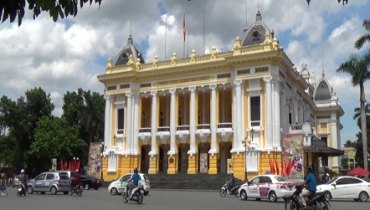Vietnam talks boost to tourism fund
The country inevitably must launch a fund to support sustainable Vietnamese tourism growth, Vu The Binh, vice president of Vietnam Tourism Association said.
Bình and other tourism agencies’ representatives joined the discussion yesterday on a draft of the revised tourism law.
According to Bình, the revised law is based on the basic content of Tourism Law 2005 and has updated regulations relevant to current affairs and targets to develop Vietnamese tourism into a spearhead economic sector.
The Vietnamese tourism sector in the first five months of this year has witnessed strong growth, with more than 5.2 million international tourists visiting Vietnamese shores, a surge of nearly 30 percent compared to the same period last year.
“We can reach the 30 percent growth, even 50 percent if we have strong resources,” Bình said.
However, he said that the Vietnamese tourism sector has yet to gather strong resources and needs a fresh “bonding force”, which he suggests will come in the form of a tourism development support fund.
Nguyễn Hồng Hải, president of the capital city’s tourism club, said that sources of the fund-- from the State, voluntary donors and other legal sources--must be clarified.
A representative of Việt Nam Society of Travel Agents (VISTA) highlighted that the fund establishment is necessary to boost Vietnamese tourism promotion around the world. In Viet Nam, the budget for tourism promotion activities remains only US$2 million on average, equivalent to only 2.9 percent of Thailand’s, 2.5 per cent of Singapore’s and 1.9 per cent of Malaysia’s.
He suggested learning from other countries’ experience in calling for investment.
Phạm Mạnh Cường, VISTA deputy general secretary, recommended funding the proposal with an accommodation tax paid by tourists staying overnight.
Accommodation ranking on debate
Controversy broke out among participants on whether accommodation rankings should be made mandatory.
Đinh Mạnh Thắng, president of Tourism Association of Central Thừa Thiên-Huế Province, said that a ranking system should not be made compulsory, as tourists determine the accommodation quality, not the State or accommodation owners.
Many participants agreed that holiday visitors are lured by high-quality accommodation at reasonable prices, not by star rankings.
However, others argued that accommodation rankings are necessary to protect rights of tourists and avoid cheating.
At the discussion, the participants also agreed on compulsory licenses of three types of tours: domestic, inbound and outbound.











.jpg)








Comments